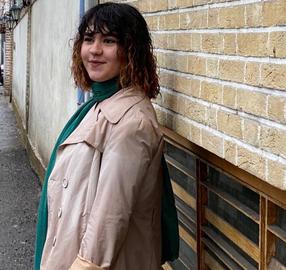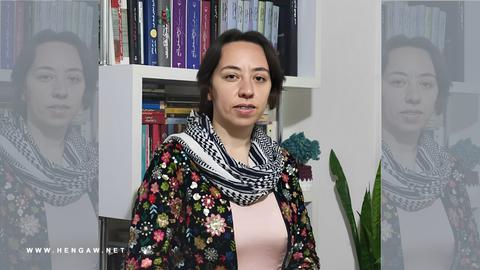Khangol Mesrzadeh’s mother tongue was Kurmanji, the most widely spoken form of Kurdish, and she became known as the “Mother of Kurmanji Lullabies”.
Her childhood was hard: “I was four months old when my father died. I do not know where I was born. I was a small orphan, raised by strangers. I had no father or mother. My aunts raised me. I only toiled. I always only toiled. When the celebration of Nowruz [Iranian New Year] came around, together with my friends, we sang songs. Hajji Firuz [a fictional character in Iranian folklore who appears in the streets in the days preceding Nowruz] would call on us and give us two tomans as a salary. We hid that money in our scarves. We were very poor, but there was no sorrow in our time.”
Mesrzadeh died on March 18, 2020. At the time public attention was focused on the coronavirus pandemic and her death did not receive any news coverage. She didn’t know the exact date of her birth or exactly where she came from, but she knew well as anyone what a song is and how it should be sung. With the magic and grief in her voice she became famous for the lullabies that resonated with her own sorrowful life story, filled with ambiguity and suffering.
Singing While Working in Walnut Gardens
Mesrzadeh believed she was born close to the time “when the Russians entered Iran”, i.e. around 1941, when the Allied forces occupied Iran. Reportedly she was born among the Sivkanlu tribe, in the village of Ughaz in Shirvan county, in northern Khorasan province. Her father left Iran for the Soviet Union when she was three months old and never came back. At the same time she and her sister were abandoned by their mother.
Kalimollah Tavahodi, a writer and researcher who was born around the same time in the same village, was the first person to draw Mesrzadeh out from her endless loneliness, writing a book called Kurmanji Songs with Farsi Translation.
“We have many highly talented artists similar to Khangol in northern Khorasan,” he wrote. “They have all either died in silence or do not dare to sing. In my book One Thousand and One Nights of Kurmanj, I try to introduce them one by one.
“Khangol spent her childhood, adolescence and youth working in walnut gardens. From childhood she would raise her voice and sing. She was legendary. So was her playmate, Madineh. But Madineh died young.”
Mesrzadeh married at a young age and gave birth to two children. According to Tavahodi, her daughter still lives in Shirvan, while her son has moved to Tehran and works as a labourer in the district of Qaleh Hasan Khan. Towards the end of her life and after the death of her husband, Tavahodi says, Mesrzadeh’s brilliant mind was wrecked by Alzheimer’s. But for decades before being struck down by illness she had been the informal keeper of Kurmanji melodies and songs.
The Kurmanjis are a group of Iranian Kurds who were driven to northern Khorasan many years ago. Kurmanji is the northern dialect of the Kurdish language and has a fascinating oral literary tradition.
Tavahodi also wrote a six-volume treatise called The Historical Migration of Kurds to Khorasan in Defense of Iran's Independence, which documents some of this hidden treasure trove. Noting that today most Iranian children are unlikely to know who Mesrzadeh was, Tavahodi says: “Khangol could be considered lucky because no woman in her deeply traditional community was allowed to sing.”
Just One Public Performance and Album
Mesrzadeh was able to give a public performance just once in her life, and only one album of her renditions is available to those interested in learning more. Many may have heard her name, but precious few have experienced her unique talent and expertise in singing Kurmanji lullabies. Those who have are unanimous: she did not receive the attention she deserved in her life.
On May 13, 2017 a special programme of performances was held in the main hall of Tehran Art College, entitled One Thousand and One Nights. The virtuosos of Maqami Music of Northern Khorasan entertained audiences, and Mesrzadeh herself also took to the stage to sing her lullabies, accompanied by musician Isa Gholipour playing the traditional string instrument the dotar. This was the first and only gathering of lovers of folk music in the presence of the Mother of Kurmanji Lullabies and her fantastic, beguiling voice.
Tavahodi had brought her there, alongside another unknown but “legendary” performer from northern Khorasan called Bibi. “Nobody even looked at them,” he recalls, “until finally somebody asked, ‘Can you sing too?’ They said, ‘Yes!’ They asked, ‘What can you sing?’ Khangol answered, ‘Whatever you say, I will sing it for you’. ‘Without it being written?’ ‘Yes’, she answered… and when she began to sing, they were flabbergasted. Everything was unique and brand new.”
The only recorded album of Mesrzadeh’s works is Kurmanji Women’s Songs, which was produced and distributed through the efforts of a group called Radio Navahi. To them and others Mesrzadeh was an invaluable treasure and a unique, living archive of Kurmanji songs. She was infatuated with singing, and used to say: “When I am alone, no matter whether I am sad or happy, I only sing, and I am alive only through these songs.”
The gestures Mesrzadeh made while singing were unique to her: the way she bent her head, closed her eyes, the way she shook her hand, head, and neck with the highs and lows of the lullaby.
She didn’t speak Persian and by the end of her life her mind had degenerated. Tragically, she had even forgotten the songs. But she never forgot singing. In the final years of her life, when asked to sing, her eyes would sparkle with joy and she would reflect on the task painstakingly, summoning up a song from her subconscious. With a deep breath she would begin singing, and all the cells in her body would respond to and be transformed by the lullaby. On occasion she would suddenly fall into a deep sorrowful silence mid-flow because she couldn’t remember the rest of the lyrics.
When news of her death broke, Kayhan Kalhor, a well-known Kurdish kamancheh (traditional string instrument) player from Iran, wrote: “Khangol Mesrzadeh is one of the numerous masters of the music of northern Khorasan, who was not discovered as she deserved. Her talents and abilities have thus been lost. The suppression of women prevented Khangol and other women artists from blossoming and being seen. Khangol could very well have been the cultural ambassador of Kurmanji women.”
visit the accountability section
In this section of Iran Wire, you can contact the officials and launch your campaign for various problems


























comments